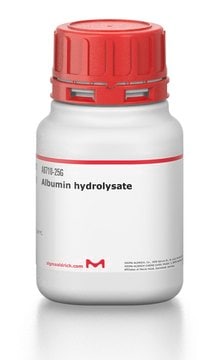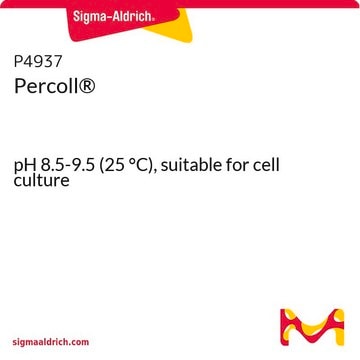H4641
Hanks′ Balanced Salt Solution 10x
Without calcium chloride, magnesium sulfate and sodium bicarbonate, 10 ×, liquid, sterile-filtered, suitable for cell culture
Synonym(s):
Hanks’ Balanced Salt solution, HBSS
Sign Into View Organizational & Contract Pricing
All Photos(1)
About This Item
UNSPSC Code:
12352207
NACRES:
NA.75
Recommended Products
Quality Level
sterility
sterile-filtered
form
liquid
concentration
10 ×
technique(s)
cell culture | mammalian: suitable
components
phenol red: yes
shipped in
ambient
Looking for similar products? Visit Product Comparison Guide
General description
Balanced salt solution (BSS) is crucial in cell culture as it serves as an irrigating, transporting, and diluting agent to maintain the intra- and extracellular osmotic balance and also provides energy for cell metabolism. It provides water and bulk inorganic ions to the cells to maintain the normal cell metabolism. BSS plays a role in the buffering system to maintain the medium within the physiological pH range (7.2-7.6).
Application
Hanks′ Balanced Salt Solution 10x has been used:
- as a diluting agent during the Chinese hamster ovary cell line detachment from growth medium
- to wash the biopsy specimens of lamina propria lymphocytes (LPLs)
- as a wash solution to wash the fish cell line during removal from growth medium
Reconstitution
Supplement with 0.35 g/L sodium bicarbonate at 1X.
supplement
Product No.
Description
Pricing
Storage Class Code
12 - Non Combustible Liquids
WGK
WGK 1
Flash Point(F)
Not applicable
Flash Point(C)
Not applicable
Certificates of Analysis (COA)
Search for Certificates of Analysis (COA) by entering the products Lot/Batch Number. Lot and Batch Numbers can be found on a product’s label following the words ‘Lot’ or ‘Batch’.
Already Own This Product?
Find documentation for the products that you have recently purchased in the Document Library.
Customers Also Viewed
Anne Grijzenhout et al.
Development (Cambridge, England), 143(15), 2716-2723 (2016-06-19)
The Polycomb repressive complexes PRC1 and PRC2 are key mediators of heritable gene silencing in multicellular organisms. Here, we characterise AEBP2, a known PRC2 co-factor which, in vitro, has been shown to stimulate PRC2 activity. We show that AEBP2 localises
Bastian Barker Rasmussen et al.
Applied and environmental microbiology, 82(15), 4802-4810 (2016-05-29)
Minimizing the use of antibiotics in the food production chain is essential for limiting the development and spread of antibiotic-resistant bacteria. One alternative intervention strategy is the use of probiotic bacteria, and bacteria of the marine Roseobacter clade are capable
Peimin Dai et al.
Life sciences, 127, 66-72 (2015-03-07)
Aconitum alkaloids mainly contain highly toxic aconitine (AC), mesaconitine (MA), and hypaconitine (HA) and less toxic benzoylaconine (BAC), benzoylmesaconine (BMA), benzoylhypaconine (BHA), aconine, mesaconine, and hypaconine. The efflux transporters including P-glycoprotein (P-gp), breast cancer resistance protein (BCRP) and multidrug resistance-associated
Alison Kuchta et al.
Clinical and vaccine immunology : CVI, 18(8), 1371-1377 (2011-06-24)
Vibrio cholerae O1 is a noninvasive enteric pathogen and serves as a model for studies of mucosal immunity. Although symptomatic V. cholerae infection induces durable protection against subsequent disease, vaccination with oral killed whole-cell V. cholerae stimulates less long-lasting protection
Iain M Dykes et al.
Scientific reports, 8(1), 10439-10439 (2018-07-12)
ZIC2 mutation is known to cause holoprosencephaly (HPE). A subset of ZIC2 HPE probands harbour cardiovascular and visceral anomalies suggestive of laterality defects. 3D-imaging of novel mouse Zic2 mutants uncovers, in addition to HPE, laterality defects in lungs, heart, vasculature
Our team of scientists has experience in all areas of research including Life Science, Material Science, Chemical Synthesis, Chromatography, Analytical and many others.
Contact Technical Service







